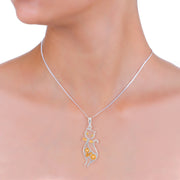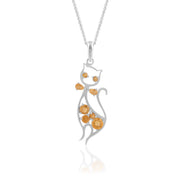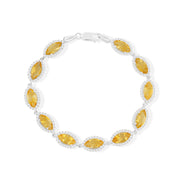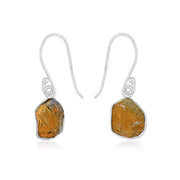With warm golden hues as that of the sun, our Citrine jewellery is a must-have for not just those born in November, but also for those who desire strength and courage.
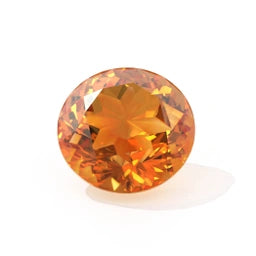
CITRINE
Getting its name from the old French word for lemon, Citrine is a yellow variety of quartz, having shades of bright yellow hue. It is called “Sunehla” in Hindi, as its warm colour is said to be a gift from the sun, much like gold itself.
Being an affordable alternative, citrine is considered an excellent substitute for yellow sapphire (Pukhraj), which is a precious gemstone, due to their similarity of benefits in astrology.
Cultural Significance
Citrine has been used in jewellery and ornamental objects for thousands of years. The ancient Greeks and Romans fashioned citrine into intaglio work and gemstones for rings.
In the 17th century, Scottish men adorned their swords and daggers with citrine, particularly in the highlands.
Citrine is often referred to as the “merchant’s stone” or the “money stone”. Throughout history, it has been associated with attracting prosperity, wealth, and success, particularly in business.
Benefits
Citrine has a hardness of 7 on the Mohs scale, making it durable enough for use in everyday jewellery, having the following benefits:
- *Clears negative thoughts
- *Encourages a positive mindset
- *Boosts inner strength
- *Improves metabolism
- *Helps in detoxification
Astrological Significance
Vedic - in Vedic astrology, citrine is associated with Jupiter (Brihaspati), the planet of wisdom, wealth, and knowledge, making it the prime choice for people seeking success in their work or business ventures. It is linked to the sun, representing power and leadership, and is also believed to attract wealth and good fortune.
Western - In Western astrology, citrine is associated with the sun, having benefits such as enhancing confidence and power, leading to emotional healing and stability. It is beneficial for Leos and Geminis but is useful for anyone wanting to attract success in their new ventures and wanting clarity and stability.
Origin
Russia, Madagascar, Spain, and Colorado contribute to the global supply of citrine, with Brazil being the major source of natural citrine, although natural citrine remains less common than its heat-treated counterparts.
Environmental Impact
Though citrine mining provides economic benefits, it is very important to keep these processes in check as they have a severe impact on their surroundings and the environment as a whole. Sustainable mining practices and responsible management are necessary to reduce land disturbance, habitat loss and water contamination and to balance resource extraction with environmental conservation and community well-being
